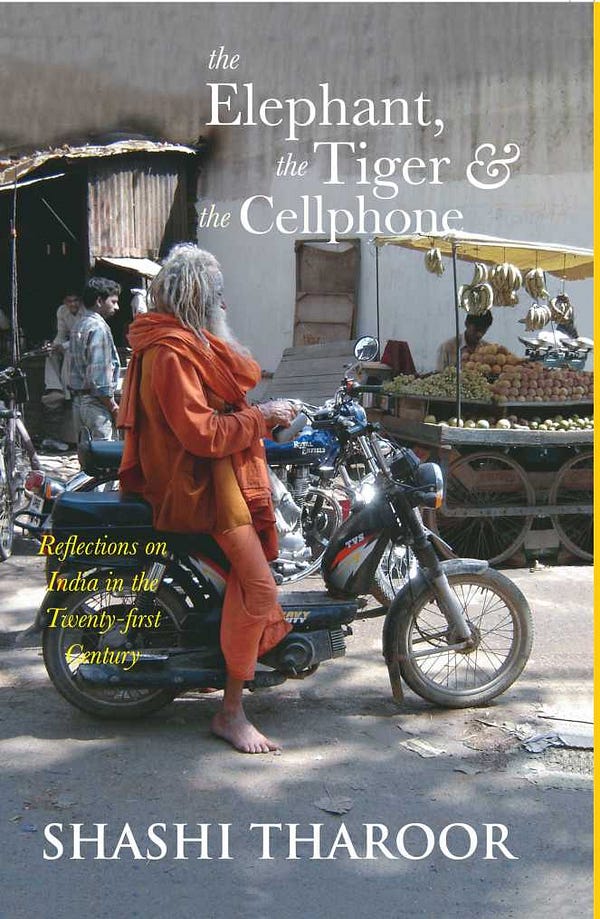The Elephant, The Tiger, and the Cellphone: India, the Emerging 21st-Century Power by Shashi Tharoor
My rating: 3 of 5 stars
The Elephant, the Tiger, and the Cellphone: Reflections on India — The Emerging 21st-Century Power is a collection of 69 essays authored by Shashi Tharoor, which have previously appeared in his own columns in The Hindu, The Indian Express & the Times of India, & in many other publications which include the New York Times, the Washington Post, the Los Angeles Times, the International Herald Tribune, India Today Plus, Time & Global Asia.
The book consists of 6 sections:
1. The Transformation of India
2. Ideas of Indianness
3. India at Work & Play
4. Indians Who Helped My India
5. Experiences of India
6. The A to Z of Being Indian
Most of the Essay topics are wisely chosen in keeping with the ‘Reflections on India’ theme. But the problem is the fact that the average length of each chapter/article is 4–5 pages, which is a desirable length & depth for a magazine article or an op-ed column but not enough for a book which promises to explore what India means to the outside world in the 21stcentury. That Shashi Tharoor comes across as a knowledgeable, well-informed, intelligent & an insightful man most of the time shouldn’t be a surprise given his diplomatic & politic career & the fact that he remains the youngest ever Under-Secretory General at the UN.
I particularly loved reading ‘Being Bangaloorued’, an essay about the Indian obsession of renaming our cities. The story about the goof-up around the renaming of Madras was fun to read. Here’s an excerpt that I particularly liked.
“In some parts of India it is customary for a bride, upon marriage, to take on a new name- not just a surname, but a first name-chosen by her husband’s family. It’s a signal that her old life is over, & that she now belongs completely to another. This is the kind of thinking that underlies India’s renaming mania. It is if the rulers of Bombay & Madras, men of dubious credentials & modest achievement, wanted to show that they are now the lords and masters of these cities- and to demonstrate the change by conferring a new name upon them. For what these aggressive nativists are doing is to demonstrate that they are now in charge, that the old days are now over. They are asserting their power, the power to decide what a thing will be, the power to name-for if one does not have the ability to create, one must at least claim the right to define.”
I was glad that I came across the articles such as ‘Hinduism and Hindutva: Caste and credo’ & ‘Of Secularisms and Conversions’ because I am glad to know that there is at least one man in the Parliament who agrees that religion/spiritual life should not be mixed with public & absolutletly never with political life. It is also good to know that he calls Babri Mosque demolition & the Gujarat riots of 2002 wrong not because of the reason that another party was responsible allegedly, but because it was-wrong.
Mr. Tharoor also brilliantly uses some anecdotes which show India as it is- a mosaic of many cultures, religions, languages & practices. He compares India’s ‘thali’ to the American ‘melting pot’:
“If America is a melting pot, then to me India is a thali — a selection of sumptuous dishes in different bowls. Each tastes different, and does not necessarily mix with the next, but they belong together on the same plate, and they complement each other in making the meal a satisfying repast.
“No one identity can ever triumph in India; both the country’s chronic plurality and the logic of the electoral market place make this impossible. India is never truer to itself than while celebrating its own diversity.”
In an essay he writes ‘I am normally allergic, both as a reader and as a reviewer, to collections of official speeches.’ Ironic, because that is exactly what the book starts to feel like at times: A collection of Official Speeches. The essays sometimes get emotionless, & starts reading like a collection of statistics to prove India Shining/Not-shining or sometimes highlighting the paradoxical nature of things. Also because it is a collection of articles published in different publications over a period of time, some of the points feel repetitive & irritating at times.
But what bothered me about the most was the fact that in many essays the author gets into South India vs. North India comparisons, which I felt was a little hypocritical when the author himself mentions(boasts) about his cosmopolitan nature of growing up- in Mumbai Bombay, Kolkata Calcutta & Delhi. On numerous occasions he starts comparing what I think is the stereotypical Kereliate (all South-Indians on some occasions) to a stereotypical North-Indian. If this could’ve been once or twice, it could’ve been passed as a sign or affection & thereby a possesiveness for one’s roots. But as I mentioned earlier, many points are repetitive, & so it creates an impression that the author is trying very hard to prove the superiority of Dravidian over the Rest.
Overall, the book makes for a okay-ish read, but isn’t as interesting as you’d expect after looking at the brilliant cover page. It becomes monotonous at times. I thought the book was a little over-hyped. Now I am trying to get my hands on one of Shashi Tharoor’s novels before I say something about him as an author.
Originally published at desipsycho.wordpress.com on February 27, 2013.
